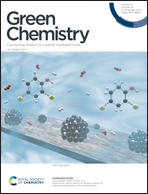Efficient biodiesel production from rice bran oil using magnetite immobilized-recombinant lipase from probiotic Bacillus licheniformis†
Abstract
With increasingly stringent environmental regulations, the pursuit of sustainable energy warrants approaches that are benign by design. Lipases have been found to be potential biocatalysts for converting fatty acid esters into biodiesel, which is one of the promising renewable energy sources. Nevertheless, most of the lipases employed for this purpose are derived from either fungal or non-probiotic sources, many of which produce harmful toxins during their life cycle. Such concerns do not arise in the case of lipases derived from probiotic origin; however, their efficacy is often below that of their fungal-derived counterparts. In the current work, we chose B. licheniformis as a probiotic source to derive native and codon-optimized lipases since they showed high potential in other applications. The lipases produced in this study have been characterized for their purity, specific activity and secondary structure, which revealed the enhanced purity and activity of the expressed lipase. Optimal reaction parameter studies with magnetite-immobilized lipases showed high efficacy even at a minimal enzyme loading of 0.11 wt% with respect to the oil in 2 h of duration. The obtained biodiesel was studied using nuclear magnetic resonance, gas chromatography, thermogravimetric analysis and rheological measurements. Three strategies were employed for the immobilization of these lipases over magnetite, which revealed retention of >50% relative activity of the best approach even at the eighth cycle. The present study opens up numerous possibilities in amalgamating various benign biotechnological approaches with enzymes derived from probiotic sources for diverse applications.



 Please wait while we load your content...
Please wait while we load your content...